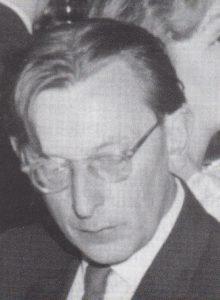
Adolph Mark Joekes was known to all his professional colleagues and friends as ‘Jo’.
Born in Leiden, Netherlands, both his parents were doctors, and he came to the UK with his family when his father, a pathologist, took a position with the UK Medical Research Council, having decided that the UK represented a more fertile environment for medical research than the Netherlands.
After qualifying in medicine at Oxford University and St. Bartholomew’s Hospital, London, Joekes decided to pursue a career as a physician and in 1940 became am MRC Fellow in neurology, his first success being to help work out for the Royal Navy an effective treatment for seasickness. Then he began to work for the Royal Air Force and was among the first to isolate adrenal cortical hormone from human urine, this being investigated because of a prevalent theory that eating large amounts of adrenal gland reduced flying fatigue!
His interest in kidney disease was stimulated by the case of a young man he cared for crushed in the Blitz, who despite recovering from otherwise rather minor injuries, died anuric two weeks later. Joekes knew of Bywaters’ work on crush syndrome, and he was able to read in Dutch Kolff’s original thesis on his work with the artificial kidney. After a further period working to develop better malaria treatments for the armed services, he eventually applied successfully in 1946 to work with Bywaters at the Royal Postgraduate Medical School, Hammersmith Hospital, bringing with him a Kolff artifical kidney; the first to be used outside the Netherlands. The first patients with acute renal failure were successfully dialysed by Bywaters, Joekes, and their colleagues in 1946-47; but despite some documented successes there was remarkably little enthusiasm for dialysis treatment for acute renal failure since the conservative approach to management, using draconian dietary and fluid restriction, held sway in the same department of medicine.
Joekes was a forward thinking innovator and in 1954 was the first in the UK to perform renal biopsies having recently moved to St. Mary’s Hospital, Paddington. Here he also began a formidable partnership with a young lecturer in pathology, Robert Heptinstall, later to become one of the giants of renal pathology. They published a series of seminal papers on clinicopathological correlations in glomerular disease. Heptinstall himself ascribes his long term interest in renal pathology to this satisfying collaboration, giving credit to Joekes’ ‘wonderful imaginative mind’.
Joekes moved to St Peter’s, St Paul’s and St. Phillip’s Hospitals [colloquially known as the ‘Saintly P’s’] and the Institute of Urology in 1959 where he continued his clinical work on acute renal failure, he investigated the pathophysiology of proteinuria, and was an early advocate of the investigative and diagnostic potential of nuclear medicine applied to the kidney.
His interest in acute renal failure also gave him a role as civilian advisor to the RAF when it set up the medical unit at RAF Halton which provided acute renal failure care not only to the armed services but in those early days to many civilian hospitals in southern England
Joekes is not recorded as attending the first meeting of the Renal Association in 1950, but was one of the Association’s invited founder members. He was also Secretary of the Renal Association from 1956 to 1961. He presented his first paper to the Association in 1956, and the range of topics of his subsequent submissions to the Association over subsequent years make clear the wide range of his nephrological interest: the role of tubular proteinuria [1956] and albumin synthesis [1959] in nephrotic syndrome, focal glomerulonephritis [1958], acute renal failure during open heart surgery [1963] and renal oxalate handling in primary hyperoxaluria and chronic renal failure [1978].
In 1956 the Renal Association received a letter from Jean Hamburger on behalf of the Societé de Pathologie Renale proposing an international meeting on the kidney in Evian in 1959. Eventually held in Evian and Geneva in 1960 this was the meeting at which the International Society of Nephrology was born. Joekes played a key role as secretary of the organising committee for the meeting. He was perhaps the obvious person to lead for the Renal Association as he was its Secretary at the time; but probably more importantly he was polylingual, and could cope when Hamburger, who was to become the first ISN President, and others preferred business to be conducted in French. Joekes is recorded as thinking that the first draft of the meeting’s scientific programme was ‘high on spa water and low on the science of renal disease’ [the Evian water company was a major sponsor of the meeting], but as the appointed secretary of the organising committee for the Geneva/Evian congress, undoubtedly should take substantial credit for the congress’s considerable success.
Joekes was a true nephrology polymath, a man of formidable intelligence whose interests spanned almost all aspects of the emerging speciality of nephrology. Inevitably we will not see his like again in this era of increasing specialisation, which inevitably favours ploughing a narrower intellectual furrow than was possible in those early pioneering days.